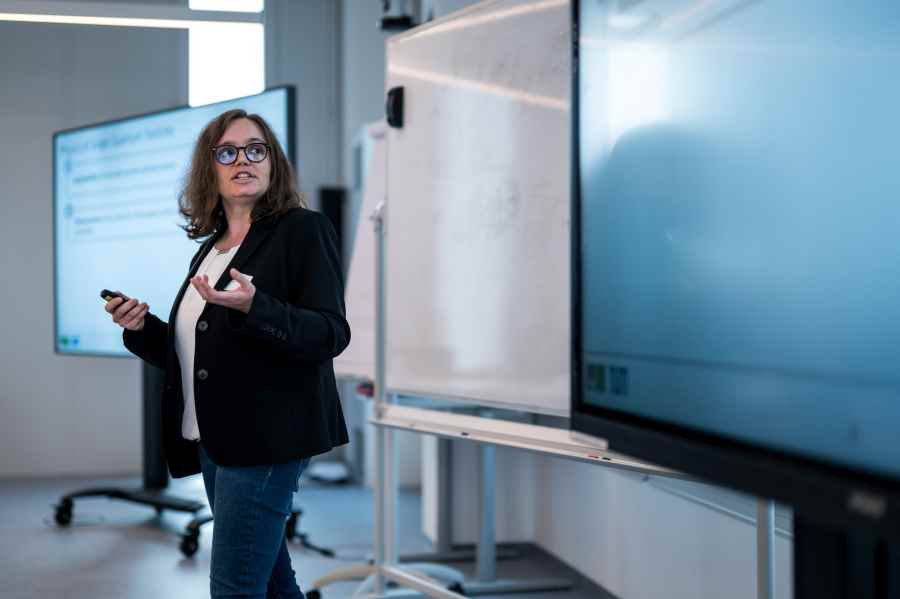Quantum Technologies, especially Quantum Computing, have been hyped in recent years. Still, the application in business is quite rare. What do you think – why should companies think about Quantum Technologies now?
Judith Gabel: Although quantum computing is promised to open up new avenues for solving real-world challenges – such as optimizing supply chains and financial portfolios or material design – there are no industry-relevant quantum computers readily available, as of yet. However, this should not deter companies from exploring quantum computing. It is essential to recognize that quantum computing operates very differently from classical computing. The methods of data input, algorithms, and problem-solving are vastly distinct. Therefore, adopting quantum computing requires companies to develop new workflows and approaches to problem-solving, which can take time.
By starting early, businesses can get ahead of the learning curve and be better prepared for when quantum solutions become more prevalent. Companies that neglect quantum computing today risk falling behind their competitors in the future.
It is also worth noting that the quantum field offers various opportunities beyond just quantum computing. Quantum communication and quantum sensing are making fast strides toward commercialization, with real-world use cases becoming available, which companies can explore now.
For this year’s course program, you have developed a Quantum Technologies Overview Course for Managers and Leaders. Why should they learn more about Quantum Technologies, and what makes this professional program unique?
Judith Gabel: Quantum technologies have the potential to disrupt various industries. By learning about these technologies, managers and leaders can stay informed about the latest advancements and judge how they may impact their business. Understanding their capabilities and limitations enables managers and leaders to make informed choices and effectively identify strategic opportunities to leverage quantum advancements. With any emerging technology, there are also risks involved. Learning about quantum technologies allows managers and leaders to assess potential risks and challenges associated with their adoption.
Our course provides a high-level overview of quantum technologies, offering participants a comprehensive understanding of this cutting-edge field. But that’s not all; the course goes beyond theory and allows participants to experience quantum technologies up close through engaging activities like lab tours and experiments on and with actual quantum devices. The practical experience helps reinforce theoretical concepts, making them more tangible and easier to grasp and connecting abstract ideas and real-world applications.
Another course dives deeper into the Quantum world: Quantum Technologies Deep Dive – A Modular Introductory Course for Scientists and Engineers. What makes this modular course so unique? What are the highlights of this course?
Judith Gabel: The Quantum Technologies Deep Dive course stands out due to its unique modular structure, allowing participants to tailor their learning journey to their specific interests and needs. By choosing the respective modules, participants can delve into the aspects of quantum technologies that are most relevant to their professional goals and gain a comprehensive understanding of just these quantum technologies.
One of the highlights of this course is the emphasis on hands-on experiences with quantum technology. This practical approach is integrated throughout the program, offering participants the opportunity to engage in quantum experiments and a lab tour. They will also have the chance to work with real quantum hardware, providing them with valuable insights into the challenges and potential of quantum technology applications. The project work that concludes the single modules is another standout feature. Here, participants will investigate various real-world applications where quantum technologies can make a significant impact. This practical exploration allows participants to bridge the gap between theory and practice, enabling them to apply their newly acquired knowledge to real-life use cases.
You have co-developed several courses in order to make Quantum Technologies more accessible for people with different professional backgrounds. What has sparked your interest in Quantum Technologies? What fascinates you the most?
Judith Gabel: What fascinates me about quantum technologies is their potential to revolutionize various industries and solve complex problems. These technologies harness the unique properties of quantum mechanics to create powerful computational systems, ultra-secure communication methods, and advanced sensors surpassing the capabilities of traditional technologies.
Yet, quantum technologies captivate me not only due to their immense potential for real-world impact but also because they offer a captivating window into the enigmatic realm of quantum physics, which is counterintuitive and introduces concepts that defy our everyday experiences. Exploring Quantum Technologies means delving into challenging problems and venturing beyond our classical understanding of reality, making their investigation both fascinating and perplexing.
Are you interested to dive deep into the fascinating world of Quantum Technologies?
Find the right Quantum Program for you:
Quantum Technologies Deep Dive – An Introductory Course for Scientists and Engineers
Quantum Technologies – Overview Course for Managers and Leaders
Join our next Masterclass on October 4.
Learn more about QL3 – Quantum LifeLong Learning.

